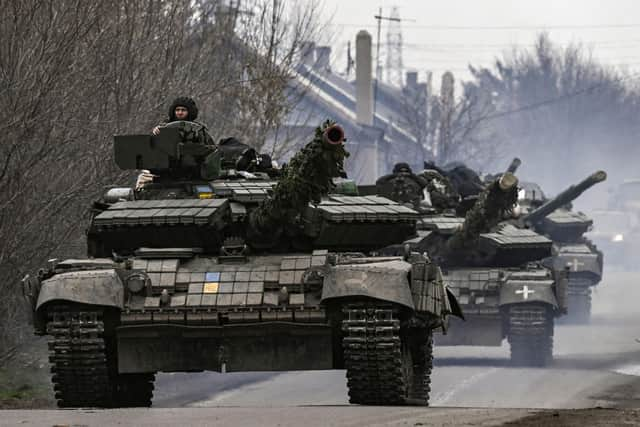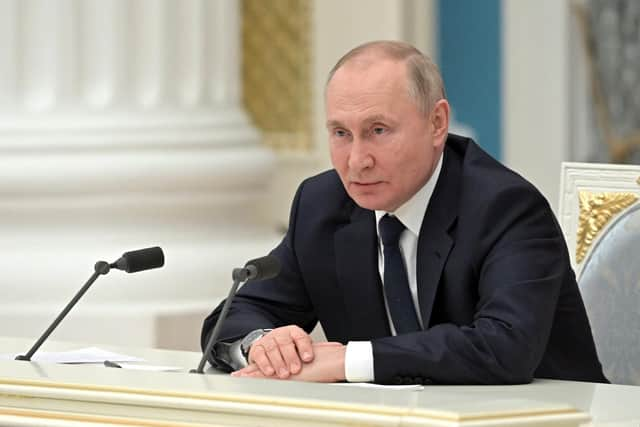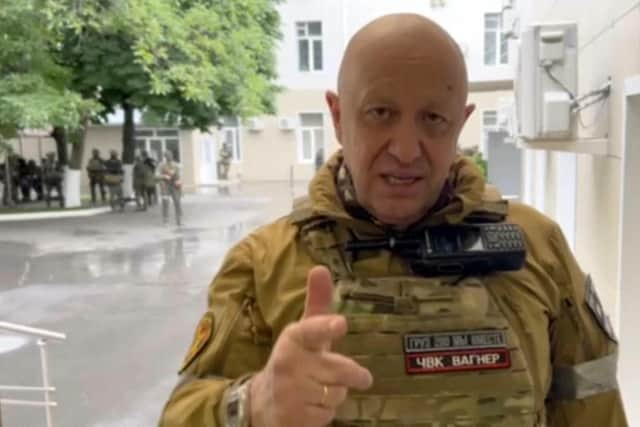Wagner coup: Why it is 'way too early' to talk about the beginning of the end of Vladimir Putin regime
It is a series of events which, just a few short days ago, would have been unimaginable. Yet, over the weekend, the balance of power within Russia looks to have shifted – although no-one yet know how it will play out.
On Saturday, Russian private mercenary organisation, the Wagner Group, which until now has been fighting on the side of the Russian army in Ukraine, looked set to launch a coup against the Kremlin.
Advertisement
Hide AdAdvertisement
Hide AdWagner Group owner Yevgeny Prigozhin, speaking by video address from Rostov-on-Don, claimed all military sites in the southern Russian city, a key crossing point for Russia’s military operation, were under their control. Furthermore, he said his troops would begin a march towards Moscow.


The Kremlin appeared to panic. President Vladimir Putin branded Wagner’s actions “precisely treason”, warning “all those who prepared the rebellion will suffer inevitable punishment”. There were rumours the president was being removed to a safe location, while city authorities in the capital warned people to stay inside and designated Monday a “non-working day” to restrict movement of the general public.
Then, suddenly, it was all over. A negotiation apparently brokered by Belarusian president Alexander Lukashenko meant the Wagner Group abandoned its plans to go to Moscow – and left Rostov-on-Don.
Why is not clear. Newspaper reports have said UK security sources believe threats were made by Russia to the families of key Wagner Group figures. Others believe Mr Prigozhin was offered a deal over the removal of defence minister Sergiu Shoigu. However, Mr Shoigu was on Monday shown still in office, apparently visiting troops on the Ukraine frontline.
Mr Prigozhin was reportedly removed to Belarus, which is, far from being a neutral country, a key ally of Russia. On Monday night he issued an 11-minute audio recording, where he stated his troops had headed to Moscow to "hold to account" those leaders he blamed for "mistakes" in the Ukraine war.


Russia bizarrely U-turned on its vow to punish those involved, by announcing neither the Wagner Group leader – nor any of the soldiers under his command – would be prosecuted.
US Secretary of State Antony Blinken claimed the series of events had “seen cracks emerge in the Russian façade”. Former Russian prime minister Mikhail Kasyanov – admittedly a long-term critic of Mr Putin – dubbed it "the beginning of the end" for the Russian president.
Some experts have claimed the “cracks” could allow other anti-Putin activists to step in. The fact the Wagner Group was able to enter Rostov without apparently encountering any resistance from residents is telling.
Advertisement
Hide AdAdvertisement
Hide AdHowever, something important to remember is that had Mr Prigozhin been successful in his coup attempt, the world could be facing an even more terrifying Russia.


Mr Prigozhin’s army has carried out some of the most atrocious actions during the conflict. His group is known for its brutality and have played a key role in Russia’s invasion, succeeding in taking Bakhmut, the city that has seen the bloodiest and longest battles in the conflict.
Despite this, most believe the Wagner Group would never have successfully reached Moscow. But that doesn’t mean the attempt won’t have wider consequences for the Kremlin.
"I don’t know what Prigozhin has got out of this,” says Luke March, deputy director of the Princess Dashkova Russian Centre at the University of Edinburgh. “The most plausible explanation is that it got completely out of hand. He was potentially trying to get attention – and get rid of Shoigu and other people he wanted to – and realised the end was coming for him anyway.”
However, Prof March pointed out the reaction of the Russian people, particularly in Rostov-on-Don where Wagner met little resistance, demonstrated a shift in levels of government support.
"I was surprised how far he got,” Prof March said. “If he had gone further, it could have been a bit of a bloodbath for him.
"The massively surprising thing is that everyone sat back and let them do it. That is a lesson for Putin that his leadership isn’t secure.”
Mr Prigozhin’s publicly stated reasons for turning against Mr Putin have ranged from claims the war against Ukraine was invalid – that Mr Putin had been given poor information by Mr Shoigu, over a risk to Russia and the presence of “Nazis” in Kyiv – to that Russia was not defeating Ukraine quickly enough and should turn to tactical nuclear weapons to end the conflict. He also claimed some Wagner troops were killed by a Russian missile attack.
Advertisement
Hide AdAdvertisement
Hide AdIn reality, the main trigger was a Kremlin order made two weeks earlier, which ordered mercenaries to sign a contract to fight under the regular Russian military, which would essentially give the Russian government control over the Wagner Group. Mr Prigozhin is also widely reported to have a personal dislike of Mr Shoigu. Technically, that order still stands and Wagner troops are due to be moved into the Russian army by next month.
In Monday night’s statement, Mr Prigozhin said he did not march to overthrow Russia's leadership, but to raise the plight of Wagner. He also claimed he had been offered a deal by Mr Lukashenko for Wagner to continue in some form from Belarus.
Speculation over the potential removal of the foreign minister – one of Mr Prigozhin’s key requests in his video address – appeared to be quashed when the defence minister made a public visit to troops fighting in Ukraine on Monday morning. However, some are sceptical of whether it did occur, claiming it could have been historic footage of a frontline visit.
Dr Steven Main, who runs the Russian Military Studies Office (RMSO) in Bathgate, disagrees that the weekend’s events could have a serious effect on Mr Putin’s leadership.
"It’s way too early to talk about the beginning of the end [of the Putin regime]," he said. Dr Main said he believed the Russian authorities were aware of Mr Prigozhin’s plans.
"I would use the word 'sudden' in inverted commas,” he said, referring to the surprise element of the Wagner mutiny. He pointed to comments made in speeches and on social media by Russian and Belarusian authorities over the past week.
"They had an inkling that something was going to go down,” he said. “There is enough evidence that shows Putin may not have known the detail, but he was aware of the thrust.”
In Ukraine, the military will now be wondering what this means for life on the battlefield. The Wagner Group’s 25,000 soldiers were among the most aggressive and highly trained of any foe faced by Ukraine. Now, the question remains as to whether they will continue to fight, potentially from Belarus – and for who?
Advertisement
Hide AdAdvertisement
Hide AdMr Prigozhin’s whereabouts also remain a mystery. His recording on Monday did not reveal his location.
It is difficult to see how Belarus would be anything other than a risky location for the Wagner Group boss. Belarusian leader Alexander Lukashenko is one of Mr Putin’s few allies in the region, although he has recently had his own troubles, due to an undisclosed health problem. That problem has seen him hospitalised a couple of times in recent weeks, raising questions over a potential Kremlin takeover of the former Soviet nation.
Earlier this month, Russia moved tactical, or short-range, nuclear weapons into Belarus as the war against Ukraine escalated. The two countries have refused to disclose how many weapons have been moved into Belarus, pointing out the short-range weapons do not fall under the terms of the New Start treaty, the last remaining US-Russia arms control treaty. The treaty caps the countries' strategic nuclear arsenals. Mr Putin has suspended Russia's participation in the agreement since the invasion of Ukraine, although both sides have pledged to continue to respect its limits.
Irina McLean, of the People’s Consulate of Belarus in Scotland, said the fate of Mr Prigozhin under the protection of Lukashenko was uncertain.
“It is very unclear,” she said. “So far, he hasn’t been seen in Belarus, despite the fact he was ordered to move. Is he safe? Is he going to be taken off the scene? We don’t know. This is Russia, after all.”
Comments
Want to join the conversation? Please or to comment on this article.
